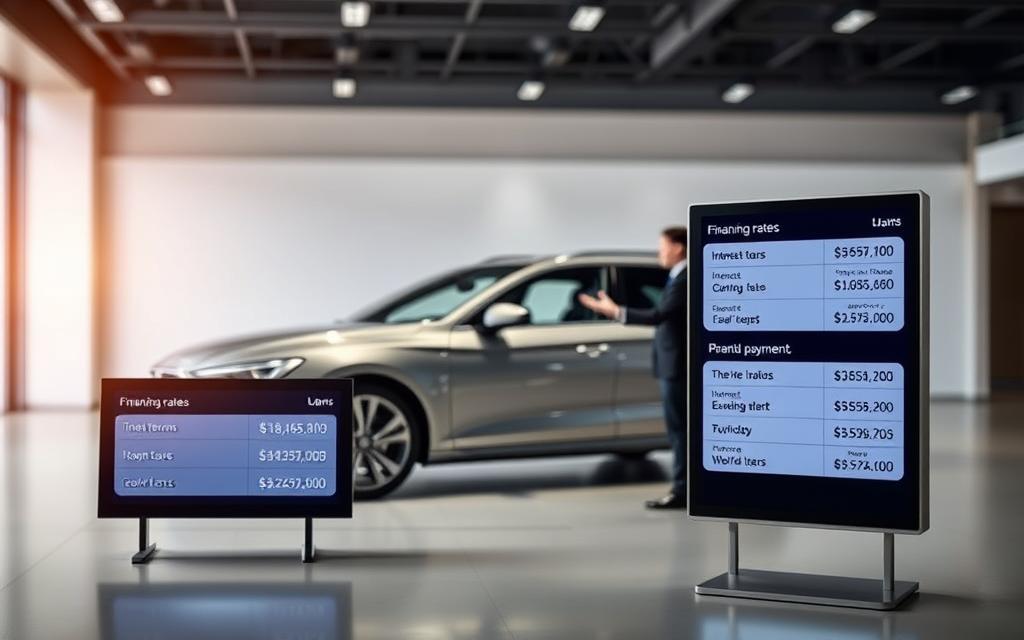Purchasing a car is a significant milestone, symbolizing independence and providing a means to manage daily life demands. However, navigating the myriad of car financing options can be daunting, even for financially savvy individuals.
Mastering the basics of car financing is crucial, particularly when it comes to loan interest rates. Different financing options and terms can significantly impact the overall cost of the vehicle. Being informed about these aspects can help individuals make smarter financial decisions.
By understanding car loan interest rates, buyers can better navigate the financing process and potentially save money.
What Determines Car Loan Interest Rates
The interest rate on your car loan is determined by a variety of factors, including your creditworthiness and the loan terms you choose. Understanding these factors can help you navigate the car financing process more effectively and potentially save you money over the life of the loan.
Credit Score Impact on Interest Rates
Your credit score plays a significant role in determining the interest rate you’ll be offered on a car loan. A higher credit score indicates to lenders that you’re a lower risk, which can lead to more favorable loan terms.
FICO Score Ranges and Their Effects
FICO scores range from 300 to 850, with higher scores corresponding to lower risk for lenders. Scores above 750 are generally considered good and can qualify you for lower interest rates. Conversely, scores below 650 may result in higher interest rates or even loan rejection.
Credit History Length Considerations
The length of your credit history also impacts your credit score and, by extension, your car loan interest rate. A longer credit history can positively affect your score, as it provides more data for lenders to assess your creditworthiness.
Loan Term Length Effects
The length of your loan term can also influence your interest rate. Generally, shorter loan terms are associated with lower interest rates, while longer terms may have higher rates.
New vs. Used Vehicle Rate Differences
Whether you’re financing a new or used vehicle can also impact your interest rate. New vehicles often qualify for lower interest rates compared to used vehicles, especially if the used vehicle is older.
Down Payment Size Influence
The size of your down payment can affect your car loan interest rate as well. A larger down payment reduces the loan amount and can lead to a lower interest rate, as it lowers the lender’s risk.
Understanding Interest Rates in Car Financing
When financing a car, understanding the intricacies of interest rates is crucial for making informed decisions. Interest rates significantly impact the total cost of your vehicle, and knowing how they work can help you navigate the car financing process more effectively.
Simple vs. Compound Interest Explained
Car loans can use either simple or compound interest. Simple interest is calculated only on the principal amount, whereas compound interest is calculated on both the principal and any accrued interest. Understanding the difference is vital, as it can significantly affect the total amount you repay.
Fixed vs. Variable Interest Rates
Interest rates on car loans can be either fixed or variable. A fixed rate remains constant throughout the loan term, providing predictable monthly payments. In contrast, a variable rate can fluctuate based on market conditions, potentially changing your monthly payments.
When Variable Rates Make Sense
Variable rates might be beneficial if market rates are expected to drop. However, they come with the risk of increased rates, which could raise your monthly payments.
Security of Fixed Rate Loans
Fixed rate loans offer stability and predictability, making them a safer choice for those who prefer knowing exactly how much they’ll pay each month.
APR vs. Interest Rate: What’s the Difference?
The Annual Percentage Rate (APR) and interest rate are often confused, but they are not the same. The APR includes additional fees and costs, providing a more comprehensive picture of the loan’s total cost.
How Interest Accrues Throughout Your Loan
Understanding how interest accrues on your car loan is essential for managing your finances. Initially, a larger portion of your monthly payment goes towards interest, but as the loan progresses, more of your payment is applied to the principal.
By grasping these concepts, you can better compare car loan offers and make more informed decisions when financing your vehicle.
How Credit Scores Influence Your Car Loan Rate
Your credit score plays a significant role in determining the interest rate you’ll qualify for when applying for a car loan. Lenders use credit scores to assess the risk of lending to you, with higher scores indicating lower risk.
Credit Score Ranges and Corresponding Interest Rates
Credit scores typically range from 300 to 850. The higher your score, the better your chances of securing a lower interest rate. Here’s a general breakdown:
| Credit Score Range | Interest Rate Range |
|---|---|
| 750-850 | 4%-6% |
| 700-749 | 5%-7% |
| 650-699 | 7%-9% |
| 600-649 | 9%-12% |
| Below 600 | 12%+ |
Improving Your Credit Score Before Applying
Improving your credit score can lead to more favorable loan terms. Quick credit improvement strategies include paying down debt and making timely payments.
Quick Credit Improvement Strategies
To quickly improve your credit score, focus on paying down existing debt and making all payments on time. Reducing your credit utilization ratio can also have a positive impact.
Long-term Credit Building Approaches
For long-term credit building, consider monitoring your credit report for errors and maintaining a diverse mix of credit types.
Getting Approved with Less-Than-Perfect Credit
If your credit score isn’t ideal, you can still get approved for a car loan, though you may face higher interest rates. Consider making a larger down payment or opting for a shorter loan term.
Impact of Recent Credit Inquiries
Recent credit inquiries can temporarily affect your credit score. Be mindful of applying for multiple credit lines in a short period, as this can negatively impact your score.
Understanding how credit scores influence your car loan rate is crucial for securing the best possible deal. By improving your credit score and being aware of the factors that affect it, you can save money on your car loan.
The Relationship Between Loan Terms and Interest Rates
Loan terms play a pivotal role in determining the interest rates for car financing, impacting both monthly payments and total interest paid. When considering a car loan, understanding how different loan terms affect your financial obligations is crucial.
Short-Term vs. Long-Term Loans
Short-term loans typically offer lower interest rates but come with higher monthly payments. In contrast, long-term loans can provide more manageable monthly payments but may result in higher total interest costs over the life of the loan.
How Extended Terms Affect Total Interest Paid
Extending the loan term can lower monthly payments, making it easier to budget. However, this often results in paying more in interest over the life of the loan. For instance, a 72-month loan might have a lower monthly payment than a 36-month loan, but the total interest paid could be significantly higher.
The 60-Month Threshold
Many lenders consider 60 months (5 years) a standard loan term. Loans shorter than this often come with lower interest rates, while longer loans might have slightly higher rates.
72-Month and 84-Month Loan Considerations
For borrowers who need more manageable monthly payments, 72-month or even 84-month loans are available. However, these longer terms can lead to a higher total interest paid. It’s essential to weigh the benefits of lower monthly payments against the increased total cost.
Finding the Sweet Spot for Your Budget
Determining the ideal loan term involves balancing monthly payments with total interest paid. Borrowers should consider their budget and financial goals when deciding on a loan term.
Early Payoff Options and Penalties
Some loans allow for early payoff without penalties, which can be a cost-effective strategy. However, borrowers should check their loan agreement for any prepayment penalties before making extra payments.
Current Market Trends in Auto Financing Rates
Understanding current market trends in auto financing rates is crucial for making informed decisions when purchasing a vehicle. The landscape of auto financing is influenced by various factors, including economic indicators and regulatory policies.
Federal Reserve Influence on Car Loan Rates
The Federal Reserve plays a significant role in shaping auto financing rates through its monetary policies. Changes in interest rates can directly impact the cost of borrowing for car loans.
Economic Factors Affecting Auto Loan Markets
Economic conditions, such as inflation and employment rates, also affect auto loan markets. A strong economy can lead to higher interest rates, while economic downturns may result in lower rates.
Seasonal Variations in Car Financing Offers
Seasonal variations can influence car financing offers, with certain times of the year seeing more favorable rates due to manufacturer incentives.
Manufacturer Incentives and Special Financing
Manufacturer incentives, such as 0% APR financing, can significantly impact auto financing rates. These offers are often seasonal and can provide substantial savings.
Calculating the True Cost of Your Car Loan
Understanding the total cost of your car loan is crucial for making informed financial decisions. When financing a vehicle, it’s not just about the purchase price or monthly payments; it’s about the total cost over the life of the loan.
Using Loan Calculators Effectively
Online loan calculators are valuable tools for determining your monthly payments and total loan cost. By inputting the loan amount, interest rate, and loan term, you can get a clear picture of your financial commitment. It’s essential to use realistic numbers based on your financial situation to get an accurate calculation.
Understanding Amortization Schedules
An amortization schedule breaks down your loan payments over time, showing how much of each payment goes towards interest and principal.
Front-Loaded Interest Explained
In the early stages of your loan, a larger portion of your monthly payment goes towards interest rather than the principal. This is known as front-loaded interest.
Principal vs. Interest Payments
Understanding how your payments are allocated between principal and interest can help you make informed decisions about your loan, such as whether to make extra payments towards the principal.
Factoring in Additional Fees and Charges
Beyond the loan interest, there are other costs associated with car financing, such as origination fees, late payment fees, and insurance costs. These can significantly impact the total cost of your loan.
| Fee Type | Average Cost | Impact on Total Cost |
|---|---|---|
| Origination Fee | $100-$500 | Increases total cost |
| Late Payment Fee | $25-$50 | Can increase total cost if frequent |
| Insurance Costs | Varies | Required for loan approval, impacts total cost |
Total Cost of Ownership Beyond Interest
The total cost of owning a vehicle includes not just the loan interest and fees, but also ongoing expenses like fuel, maintenance, and repairs. Considering these costs is crucial for understanding the true financial impact of your car purchase.
Comparing Financing Options: Dealers vs. Banks vs. Credit Unions
When it comes to financing a car, understanding the various options available is crucial for making an informed decision. Car buyers can choose from dealership financing, bank auto loans, and credit unions, each offering different benefits and drawbacks.
Dealership Financing Pros and Cons
Dealership financing is convenient, as it allows buyers to handle both the purchase and financing in one place. Captive lenders and manufacturer incentives can offer competitive rates. However, dealer markup on interest rates can increase the overall cost.
Captive Lenders and Manufacturer Incentives
Captive lenders, owned by car manufacturers, often provide special financing deals that can be very attractive. These incentives can lead to lower interest rates or better loan terms.
Dealer Markup on Interest Rates
Dealers may increase the interest rate on your loan, potentially leading to higher monthly payments. Understanding this risk is crucial when opting for dealership financing.
Bank Auto Loans: What to Expect
Banks offer traditional auto loans with fixed interest rates and terms. Your credit score plays a significant role in determining the interest rate you’ll qualify for.
Credit Union Advantages for Car Financing
Credit unions are member-owned cooperatives that often provide more favorable loan terms compared to traditional banks. They may offer lower interest rates and more flexible repayment options.
Online Lenders and Their Competitive Rates
Online lenders have gained popularity due to their competitive rates and streamlined application processes. They can offer quick pre-approvals and flexible terms.
Pre-Approval Benefits Across All Lenders
Getting pre-approved for a car loan can give you negotiating power and a clearer understanding of your budget. It’s beneficial across all types of lenders, including dealerships, banks, and credit unions.
| Lender Type | Pros | Cons |
|---|---|---|
| Dealership Financing | Convenient, Manufacturer Incentives | Potential for Dealer Markup |
| Bank Auto Loans | Fixed Rates, Traditional Terms | Credit Score Dependency |
| Credit Unions | Lower Interest Rates, Flexible Terms | Membership Requirements |
| Online Lenders | Competitive Rates, Quick Pre-Approvals | Variable Terms, Less Personal Interaction |
Negotiation Strategies for Better Interest Rates
To minimize the cost of your car loan, it’s essential to develop effective negotiation strategies for interest rates. Getting pre-approved for a loan before car shopping gives you a clear idea of what you can afford and puts you in a stronger negotiating position at the dealership.
Leveraging Pre-Approval Offers
Having a pre-approval offer in hand allows you to compare the dealer’s financing terms with your pre-approved rate. This can be a powerful tool in negotiating a better interest rate. Use your pre-approval as leverage to negotiate a more favorable rate, ensuring you’re not overpaying for your car loan.
Timing Your Purchase for Rate Advantages
The timing of your car purchase can significantly impact the interest rate you’re offered. Certain times of the year or month can provide opportunities for better financing terms.
End-of-Month and End-of-Quarter Opportunities
Dealerships often have sales quotas to meet at the end of the month or quarter. Buying during these periods can result in more favorable financing terms as salespeople are more motivated to meet their targets.
Model Year Changeover Benefits
When new car models are released, dealerships typically want to clear out the older inventory. This can be an ideal time to negotiate not only the car’s price but also the financing terms, potentially securing a better interest rate.
Negotiation Tactics That Actually Work
Effective negotiation involves being informed and confident. Researching current interest rates and understanding your credit score can help you negotiate a better rate. Don’t be afraid to walk away if the terms aren’t favorable; this can sometimes prompt the dealer to offer a better deal.
When to Walk Away from a Financing Offer
If the financing terms offered are not in line with your pre-approved rate or market standards, it may be wise to walk away. There are plenty of other financing options available, and being willing to explore them can strengthen your negotiating position.
Common Mistakes to Avoid When Financing a Vehicle
Many people make costly mistakes when financing a vehicle, but these can be avoided with the right knowledge. Understanding the intricacies of car financing can save you money and reduce stress.
Focusing Only on Monthly Payments
One common mistake is focusing solely on monthly payments without considering the total cost of the loan. This can lead to agreeing to a longer loan term, which may result in paying more interest over the life of the loan.
Skipping the Fine Print
It’s crucial to read the fine print of your loan agreement. Hidden fees and add-ons can significantly increase the cost of your loan.
Hidden Fees and Add-Ons
Dealerships may offer additional products like extended warranties or maintenance plans. While these can be valuable, they may come with hefty price tags. Ensure you understand what’s included and whether it’s mandatory.
Prepayment Penalty Clauses
Some loan agreements include prepayment penalties for paying off the loan early. Understand these terms to avoid unexpected costs.
Not Shopping Around for Better Rates
Comparing rates from different lenders can help you secure a better deal. Don’t settle for the first offer you receive; instead, shop around to find the most competitive rates.
Ignoring Refinancing Opportunities
If interest rates drop after you’ve financed your vehicle, refinancing your loan could save you money. Keep an eye on market trends and consider refinancing if it makes financial sense.
Falling for “0% Financing” Without Reading Terms
“0% financing” deals can be enticing, but they often come with conditions. Ensure you understand the terms, including any requirements for a significant down payment or specific loan terms.
| Mistake | Consequence | Prevention |
|---|---|---|
| Focusing only on monthly payments | Paying more interest over the loan term | Consider the total cost of the loan |
| Skipping the fine print | Unexpected fees and charges | Read the loan agreement carefully |
| Not shopping around | Missing out on better interest rates | Compare rates from multiple lenders |
Conclusion: Making Informed Decisions on Car Loan Interest Rates
Understanding car financing is a valuable skill that empowers individuals to make informed decisions aligning with their financial goals and needs. By grasping the basics of car loan interest rates, borrowers can navigate the complex car financing process with confidence.
To make the most of car financing, it’s essential to apply best practices for comparing car loan interest rates. This includes researching and comparing rates from various lenders, understanding the terms and conditions of the loan, and calculating interest rates on car loans to determine the total cost of ownership.
By doing so, individuals can avoid common pitfalls and make informed decisions that save them money in the long run. As the automotive market continues to evolve, staying informed about car loan interest rates and financing options will remain crucial for anyone looking to purchase a vehicle.


